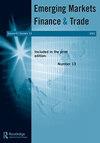ICT, Financial Inclusion and the Informal Economy: Evidence from Selected Latin American and Caribbean Countries
IF 3.1
3区 经济学
Q2 BUSINESS
引用次数: 0
Abstract
ABSTRACTExploring effective tools to control the rampant expansion of the informal economy is critical to achieving the Sustainable Development Goals (SDGs). Based on balanced panel data for 19 selected Latin American and Caribbean countries for the period 2008–2017, this study employs fixed-effects estimation, limited information maximum likelihood estimation, and system generalized method of moments estimation to investigate the direct and indirect effects of information and communication technologies (ICT) diffusion on the size of the informal economy. The findings suggest that ICT diffusion can significantly reduce the size of the informal economy in LAC. Moreover, the dampening effect of ICT on the informal economy is more significant in countries with lower levels of financial inclusion. Accordingly, we recommend strengthening ICT sector development to enhance financial deepening and government efficiency and thus reduce informality in LAC.KEYWORDS: Financial inclusionICT diffusioninformal economyLatin America and the caribbeanJEL: C33E26O17O30 AcknowledgmentsThe authors thank the editors and anonymous reviewers for their helpful comments and suggestions. All remaining errors are ours.Disclosure StatementNo potential conflict of interest was reported by the author(s).Data StatementThe data that support the findings of this study are available from the corresponding author upon reasonable request.Notes1. https://www.heritage.org/index/.2. Since the coefficient of the variable FBB is not significant in column (1), only variables MOB and INTE are used as explanatory variables in the subsample regression.Additional informationFundingThis work was supported by a project of the Department of International Cooperation and Exchanges, Ministry of Education of the People’s Republic of China. Project Title:Research on High-Quality Development of Digital Economy Cooperation between China and Latin America in the Post-COVID-19 Era. Project [No. 2022-N49].信息通信技术、普惠金融和非正规经济:来自拉丁美洲和加勒比国家的证据
摘要探索有效的工具来控制非正规经济的猖獗扩张是实现可持续发展目标的关键。本研究基于拉丁美洲和加勒比地区19个国家2008-2017年的均衡面板数据,采用固定效应估计、有限信息最大似然估计和系统广义矩估计方法,探讨了信息通信技术(ICT)扩散对非正规经济规模的直接和间接影响。研究结果表明,信息通信技术的扩散可以显著降低拉丁美洲和加勒比地区非正规经济的规模。此外,信息通信技术对非正规经济的抑制作用在普惠金融水平较低的国家更为显著。因此,我们建议加强信息通信技术部门的发展,以促进金融深化和政府效率,从而减少拉丁美洲和加勒比地区的非正式性。关键词:金融普惠;信息通信技术扩散;非正式经济;拉丁美洲和加勒比地区[j]: C33E26O17O30致谢作者感谢编辑和匿名审稿人提供的有益意见和建议。所有剩下的错误都是我们的。披露声明作者未报告潜在的利益冲突。数据声明支持本研究结果的数据可在合理要求下从通讯作者处获得。https://www.heritage.org/index/.2。由于变量FBB的系数在(1)列中不显著,所以在子样本回归中只使用变量MOB和INTE作为解释变量。本研究得到了中华人民共和国教育部国际合作与交流司项目的支持。项目名称:后新冠肺炎时代中拉数字经济合作高质量发展研究项目没有。2022 - n49]。
本文章由计算机程序翻译,如有差异,请以英文原文为准。
求助全文
约1分钟内获得全文
求助全文
来源期刊

Emerging Markets Finance and Trade
Multiple-
CiteScore
7.80
自引率
10.00%
发文量
182
期刊介绍:
Emerging Markets Finance and Trade publishes research papers on financial and economic aspects of emerging economies. The journal features contributions that are policy oriented and interdisciplinary, employing sound econometric methods, using macro, micro, financial, institutional, and political economy data. Geographical coverage includes emerging market economies of Europe, the Balkans, the Middle East, Asia, Africa, and Latin America. Additionally, the journal will publish thematic issues and occasional special issues featuring selected research papers from major conferences worldwide.
 求助内容:
求助内容: 应助结果提醒方式:
应助结果提醒方式:


